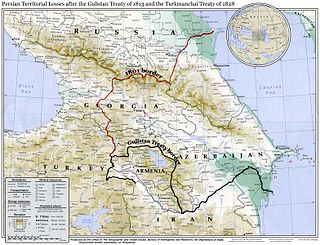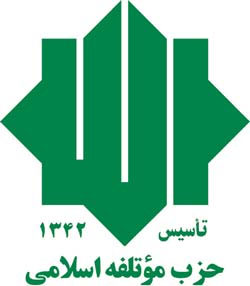Related Research Articles

Ali Shamkhani is an Iranian two-star general. He is the secretary of the Supreme National Security Council of Iran.
Fath Persian: فتح lit. The Conquest) was a Persian-language daily newspaper published in Iran.

Fatḥ-ʻAli Šâh Qâjâr was the second Shah (king) of Qajar Iran. He reigned from 17 June 1797 until his death. His reign saw the irrevocable ceding of Iran's northern territories in the Caucasus, comprising what is nowadays Georgia, Dagestan, Azerbaijan, and Armenia, to the Russian Empire following the Russo-Persian Wars of 1804–1813 and 1826–1828 and the resulting treaties of Gulistan and Turkmenchay. Historian Joseph M. Upton says that he "is famous among Iranians for three things: his exceptionally long beard, his wasp-like waist, and his progeny."

The Treaty of Gulistan was a peace treaty concluded between the Russian Empire and Iran on 24 October 1813 in the village of Gulistan as a result of the first full-scale Russo-Persian War,. The peace negotiations were precipitated by the successful storming of Lankaran by General Pyotr Kotlyarevsky on 1 January 1813.

The Treaty of Turkmenchay was an agreement between Qajar Iran and the Russian Empire, which concluded the Russo-Persian War (1826–28). It was signed on 10 February 1828 in Torkamanchay, Iran. The treaty made Persia cede to Russia the control of several areas in the South Caucasus: the Erivan Khanate, the Nakhchivan Khanate and the remainder of the Talysh Khanate. The boundary between Russian and Persia was set at the Aras River. The territories are now Armenia, the south of the Republic of Azerbaijan, Nakhchivan and Iğdır Province.

The Karabakh Khanate was a semi-independent Turkic khanate on the territories of modern-day Armenia and Azerbaijan established in about 1748 under Iranian suzerainty in Karabakh and adjacent areas. The Karabakh khanate existed until 1806, when the Russian Empire gained control over it from Iran. The Russian annexation of Karabakh was not formalized until the Treaty of Gulistan in 1813, when, as a result of Russo-Persian War (1804–13), Fath-Ali Shah of Iran officially ceded Karabakh to Tsar Alexander I of Russia. The khanate was abolished in 1822, after a few years of Russian tolerance towards its Muslim rulers, and a province, with a military administration, was formed.
Parliamentary elections were held in Iran on 18 February 2000, with a second round on 5 May. The result was a solid victory for 2nd of Khordad Front and its allies, the reformist supporters of President Mohammad Khatami.

Ahmad Madani was an Iranian politician, Commander of Iranian Navy (1979), governor of the Khuzestan province (1979–80) and candidate in the first Iranian presidential election. Madani became a navy Commodore in 1970, but was removed in 1973. He later became a navy commander after the revolution and was the first ever Minister of Defence under the new regime. Madani was also elected to the first parliament from Kerman, but was not approved. He eventually fled to the United States in 1980.

The Islamic Coalition Party is a conservative political party in Iran that favors economic liberalism.

Shahrak-e Vahdat-e Eslami is a village in Bagheli-ye Marama Rural District, in the Central District of Gonbad-e Qabus County, Golestan Province, Iran. At the 2006 census, its population was 1,441, in 308 families.
Mazraeh-ye Ali Eslami Shomareh Yek is a village in Kongor Rural District, in the Central District of Kalaleh County, Golestan Province, Iran. At the 2006 census, its population was 1,030, in 248 families.
Hoseynabad-e Eslami is a village in Bayaz Rural District, in the Central District of Anar County, Kerman Province, Iran. At the 2006 census, its existence was noted, but its population was not reported.
Tolombeh-ye Eslami is a village in Baghin Rural District, in the Central District of Kerman County, Kerman Province, Iran. In the 2006 census, its existence was noted, but its population was not reported.

Hoseynabad-e Eslami is a village in Koshkuiyeh Rural District, Koshkuiyeh District, Rafsanjan County, Kerman Province, Iran. At the 2006 census, its population was 16, in 6 families.
Tolombeh-ye Ahmad Eslami is a village in Estabraq Rural District, in the Central District of Shahr-e Babak County, Kerman Province, Iran. At the 2006 census, its existence was noted, but its population was not reported.

Kalaleh Eslami is a village in Dizmar-e Sharqi Rural District, Minjavan District, Khoda Afarin County, East Azerbaijan Province, Iran. At the 2006 census, its population was 243, in 60 families.
Eslami Emam Reza Garrison is a village and military installation in Qareh Naz Rural District, in the Central District of Maragheh County, East Azerbaijan Province, Iran. At the 2006 census, its population was 3,361, in 853 families.

Chah-e Mohammadabad Eslami is a village in Bahadoran Rural District, in the Central District of Mehriz County, Yazd Province, Iran. At the 2006 census, its existence was noted, but its population was not reported.
Office for the Cooperation of the People with the President was a political organization in Iran that was closely associated to then-President Abolhassan Banisadr.

Seyyed Reżā Zavāreʾi was an Iranian jurist and politician. He served as a member of the Member of Guardian Council from 1995 to 1996, and 1998 to 2004.
References
- ↑ Rubin, Barry M. (2002). Crises in the contemporary Persian Gulf. Routledge. p. 285. ISBN 978-0-7146-5267-2.
- ↑ "Press crackdown leads to court action in Iran". The Free Lance-Star . Associated Press. 3 January 2001. Retrieved 23 February 2011.
| | This article about an Iranian journalist is a stub. You can help Wikipedia by expanding it. |